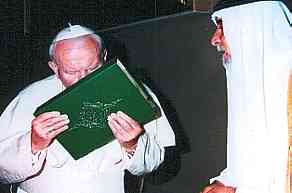Again you insist on the term "literal", which means we are going around in circles. It does seem you are not really listening to what I'm saying. The Orthodox do NOT subscribe to transubstantiation, and I have given sources on that. They do of course subscribe to the Real Presence.
Every source I've read on the Orthodox position says that they do maintain that it really is His Body and Blood. True - the term "Transubstation" is a Catholic term associated with an explanation for this is so, a rationale attempt at explaining the tradition that the bread and wine are literally/truly His Body and Blood. The Orthodox agree that it is - but don't accept the Catholic attempt at explaining how this is so.
Of course, if you can provide me with resources you find reliable on Orthodox Doctrine on this matter I would be happy to read them. I will go back and re-read your earlier post, of course, too.
To deliver on my promise concerning Justin and the accusations of cannibalism, here it is:
For I myself, too, when I was delighting in the doctrines of Plato, and heard the Christians slandered, and saw them fearless of death, and of all other things which are counted fearful, perceived that it was impossible that they could be living in wickedness and pleasure. For what sensual or intemperate man, or who that counts it good to feast on human flesh,[4] could welcome death that he might be deprived of his enjoyments, and would not rather continue always the present life, and attempt to escape the observation of the rulers; and much less would he denounce himself when the consequence would be death? This also the wicked demons have now caused to be done by evil men. For having put some to death on account of the accusations falsely brought against us, they also dragged to the torture our domestics, either children or weak women, and by dreadful torments forced them to admit those fabulous actions which they themselves openly perpetrate; about which we are the less concerned, because none of these actions are really ours, and we have the unbegotten and ineffable God as witness both of our thoughts and deeds. For why did we not even publicly profess that these were the things which we esteemed good, and prove that these are the divine philosophy, saying that the mysteries of Saturn are performed when we slay a man, and' that when we drink our fill of blood, as it is said we do, we are doing what you do before that idol you honour, and on which you sprinkle the blood not only of irrational animals, but also of men, making a libation of the blood of the slain by the hand of the most illustrious and noble man among you? And imitating Jupiter and the other gods in sodomy and shameless intercourse with woman, might we not bring as our apology the writings of Epicurus and the poets? But because we persuade men to avoid such instruction, and all who practise them and imitate such examples, as now in this discourse we have striven to persuade you, we are assailed in every kind of way. But we are not concerned, since we know that God is a just observer of all. But would that even now some one would mount a lofty rostrum, and shout with a loud voice, "Be ashamed, be ashamed, ye who charge the guiltless with those deeds which yourselves openly commit, and ascribe things which apply to yourselves and to your gods to those who have not even the slightest sympathy with them. Be ye converted; become wise." (The Second Apology of Justin Martyr, Chapter XII)
We see here that one of the accusations that the Early Christians face was that of cannibalism, and Justin denounces it completely as an outrageous lie - and instead turns the accusation back on the pagans who actually made such things their practice.




